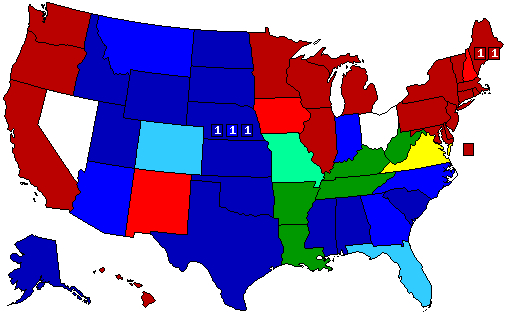1992-2012 results (where to start the discussion):

The archaic red for Democrats and blue for Republicans is in place.
Deep red -- Democrats win every Presidential race.
Medium red -- Democrats win all but one Presidential race.
White -- always went with the winner
Pale blue -- went for the winner in all election, but in that exception went for the Republican
Yellow -- twice Democratic, but seeming to now drift Democratic
Green -- twice Democratic but seeming to drift Republican (Missouri in a light shade because Obama was close in 2008, others deep green)
Medium blue -- Republicans win all but one Presidential race.
Deep blue --Republicans win every Presidential race.
... This is where we reasonably start. Any information from before 1992 is irrelevant to current reality. Anyone who predicts that a state in deep (or even medium) red or deep (or even medium) blue is going to vote differently from how it has voted in the last six elections has some explaining to do. How California or Texas voted in 1976 or earlier no longer matters. States in pale shades or white can be understood as swing states in anything near a 50-50 election.
No state is in pink, so by this 'reasonable swing states' are
CO FL MO NV OH VA
If you see something out of recent norms happening in Arizona or Iowa, then you can add those. I would be tempted to replace MO with NC based on 2012.
